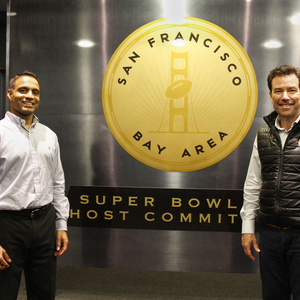Super Bowl kicks off with clean diesel tech, renewable diesel

Photo: Neste Corp.
February 5, 2016
BY The Diesel Technology Forum
The widely attended fan festivals and transportation to this week’s championship football game in San Francisco are the latest in a long line of entities to recognize advanced biofuels—including biodiesel and renewable diesel fuel—in meeting climate, clean air and sustainability goals. These advance biofuels, when used in diesel engines, can reduce carbon emissions by at least 50 percent, improving air quality and contributing to a sustainable energy future.
San Francisco’s host committee is seeking to create a “Net Positive” for the Bay Area from the numerous events associated with the game, including environmental factors. The fan festival events throughout the week will be powered by Neste NExBTL renewable diesel fuel, Tier 4 diesel generators, and transportation to Sunday’s championship game will include renewable diesel fuel and modern clean diesel buses.
“In California and throughout the world, clean diesel power and fuels are already meeting the mutual demands of sustainability and reliability in the most demanding and high-profile applications,” said Allen Schaeffer, executive director of the Diesel Technology Forum. “New technology diesel engines coupled with advanced biofuels, including biodiesel and renewable diesel fuel, are already scoring major points with municipalities and leading industries alike. Diesel generators provide the unique combination of power, performance, portability and efficiency. And, with the use of renewable diesel fuels these generators deliver the reliability that major sporting events require while improving air quality and contributing to a sustainable future that benefits everyone.”
Advertisement
Schaeffer added that the growing emphasis on addressing climate change and meeting more stringent clean air requirements through the use of advanced fuels and technology are priorities being adopted by communities around the world. “While there are a growing number of choices of fuels and technologies, clean diesel power and renewable fuels stand out as ready to meet tomorrow’s challenges today,” he said.
Advertisement
Related Stories
Luxury North Dakota FBO, Overland Aviation—together with leading independent fuel supplier, Avfuel Corp.— on May 19 announced it accepted a 8,000-gallon delivery of sustainable aviation fuel (SAF) on May 12.
Neste and FedEx, the world’s largest express cargo airline, have agreed on the supply of 8,800 metric tons (more than 3 million gallons) of blended Neste MY Sustainable Aviation Fuel to FedEx at Los Angeles International Airport (LAX).
Wheels Up Experience Inc. on May 6 announced the launch of its new SAF program, under which Wheels Up will partner with Delta Air Lines to purchase SAF, allowing private fliers to participate regardless of their flight operator or departure airport.
Germany-based Mabanaft on April 17 announced it started to supply SAF to airlines at Frankfurt Airport in January. The company said it will deliver more than 1,000 metric tons of SAF to the airport this year under the European SAF mandate.
easyJet and ATOBA Energy, in partnership with World Fuel Services, announce the signing of a memorandum of understanding for the development of long-term supply of SAF for easyJet’s operations in Europe and the U.K.
Upcoming Events










